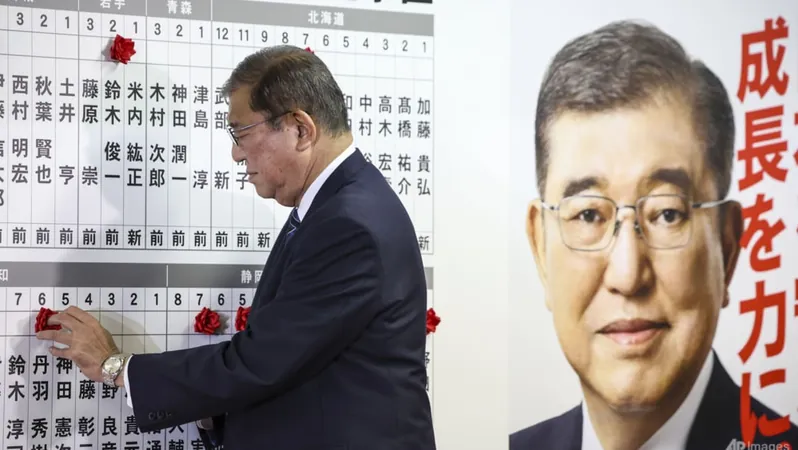
Shigeru Ishiba's Premiership in Peril: The Fallout from a Political Miscalculation!
2024-10-29
Author: Daniel
Shigeru Ishiba's Premiership in Peril: The Fallout from a Political Miscalculation!
Shigeru Ishiba, Japan’s Prime Minister, faces a swirling crisis following his ill-fated decision to call a snap election, which resulted in a staggering loss for his ruling Liberal Democratic Party (LDP). Analysts are now questioning the viability of Ishiba’s leadership, particularly as he prepares for a potentially contentious vote of confidence in the coming weeks.
Despite claiming he intends to remain in office following the election setback, uncertainty looms over whether the 67-year-old Ishiba can maintain his position. Observers note that not only is Ishiba contending with a revitalized opposition, but he is also grappling with a profound lack of trust burgeoning within his own party.
The Hasty Gamble that Backfired
Ishiba, who assumed office on October 1, believed he could leverage a surge in public support during his early days as Prime Minister by initiating a quick election. Unfortunately for him, voters reacted negatively, punishing the LDP over ongoing scandals and rising living costs. The resulting loss of seats represented the party's worst electoral outcome since its temporary loss of power in 2009.
Political experts have noted, “It was a monumental error for Ishiba to push for an election so abruptly. He should have allowed time for public sentiment regarding the LDP’s controversies to settle.”
A Major Shift in Parliament
In a remarkable turn of events, the main opposition party, the Constitutional Democratic Party (CDP), surged to prominence by securing 148 seats, a significant increase from their previous 98. Meanwhile, the LDP, alongside its coalition partner Komeito, now holds merely 215 seats — well below the 233 needed to command a simple majority in the Diet.
This shift has provided fertile ground for political maneuvers, with many speculating on possible coalition arrangements as no single party emerges with a decisive mandate to lead Japan's economy, the fourth largest in the world.
Why Did the LDP Stumble?
Public discontent toward the LDP primarily stemmed from perceived failures in political reforms and the contentious slush fund scandal that erupted last December. Voters expressed further dismay upon discovering that funds were still being allocated to local chapters of the LDP tied to implicated lawmakers.
Experts suggest that “The LDP’s lackluster handling of this scandal severely damaged public trust. Voters are frustrated with the persistent issues of corruption prevalent in money politics, and they took that frustration to the polls.”
What Lies Ahead for the LDP?
As the LDP struggles to regroup, they will need to secure a coalition partner to establish a majority. Potential candidates include the Democratic Party for the People (DPP) and the Japan Innovation Party (Ishin), but analysts warn that aligning with the LDP could tarnish the reputation of any partnering parties.
Political observers are keenly watching for strategies from both the LDP and opposition leaders, as the coming weeks will reveal whether Ishiba can cement his leadership or if he will be forced to step down in favor of an opposition candidate, such as former economic security minister Sanae Takaichi.
A Time of Instability on the Economic Horizon?
As debates over coalition dynamics unfold, economists caution that political instability may influence forthcoming economic policies, particularly the Bank of Japan’s approach to interest rates. Inflation has positioned itself at the forefront of national concerns, and any leadership instability could exacerbate challenges facing households across the nation.
Mio Kato, founder of a leading analytics firm, emphasized that “There is widespread consensus among politicians about the urgency of addressing inflation and supporting citizens through these economic pressures. The new leadership will have to deliver real solutions that resonate with the public.”
The Path Forward: A Crucial Test for Ishiba
Ultimately, Ishiba's future and the fate of his government rest on their ability to restore trust, unite party factions, and navigate the political landscape to establish a coalition before the impending parliamentary vote. Should he manage to withstand this political storm, it could either cement his role as a decisive leader or signal the beginning of a broader transformation in Japan’s political arena — the aftermath of which may shape the nation’s policies for years to come!
Stay tuned as this political drama unfolds in Japan!



 Brasil (PT)
Brasil (PT)
 Canada (EN)
Canada (EN)
 Chile (ES)
Chile (ES)
 España (ES)
España (ES)
 France (FR)
France (FR)
 Hong Kong (EN)
Hong Kong (EN)
 Italia (IT)
Italia (IT)
 日本 (JA)
日本 (JA)
 Magyarország (HU)
Magyarország (HU)
 Norge (NO)
Norge (NO)
 Polska (PL)
Polska (PL)
 Schweiz (DE)
Schweiz (DE)
 Singapore (EN)
Singapore (EN)
 Sverige (SV)
Sverige (SV)
 Suomi (FI)
Suomi (FI)
 Türkiye (TR)
Türkiye (TR)